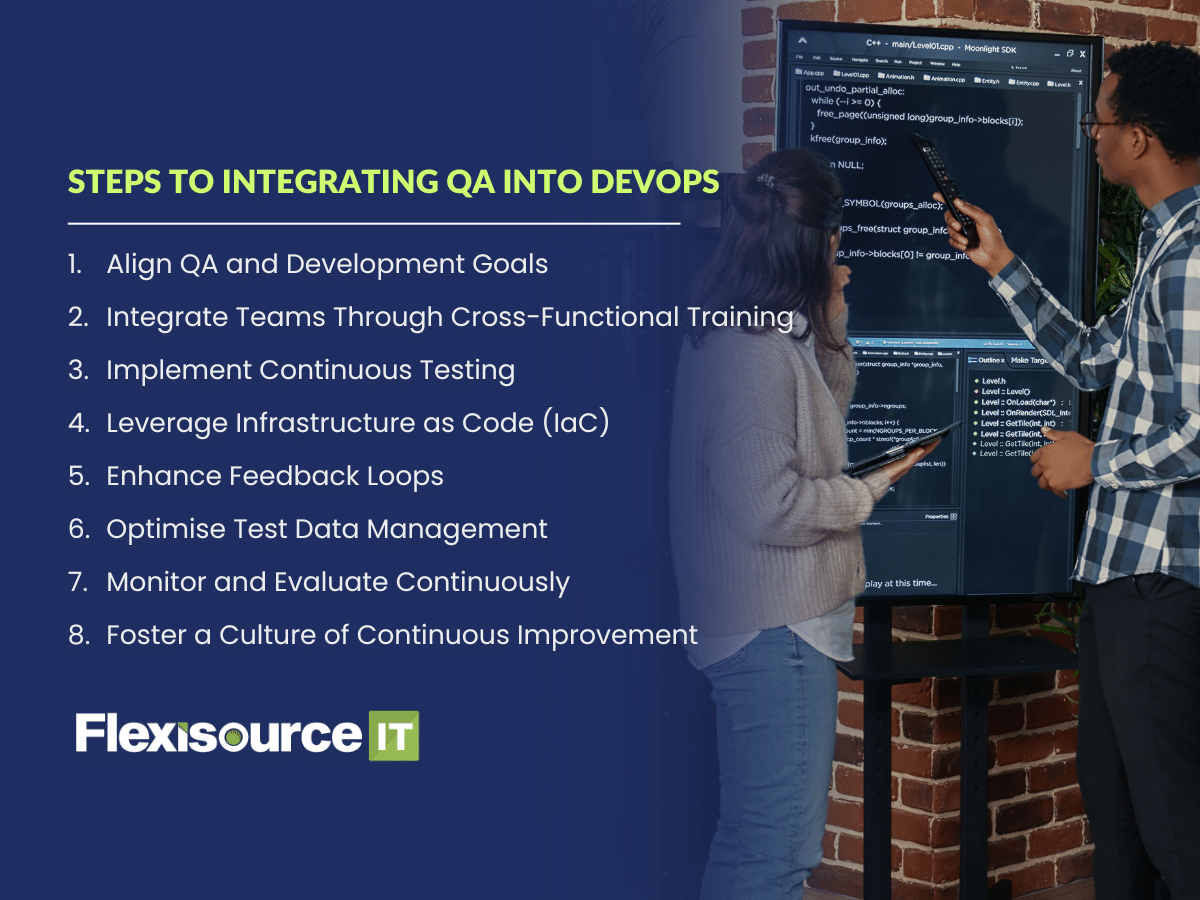QA in DevOps is crucial to the progress and functionality of any application or project. But anyone planning to use QA testing should first learn more about DevOps, QA, its role in DevOps, and how to integrate it seamlessly.
Unfortunately, the information on its role and everything related can be difficult to find. That’s why we went ahead and explained everything to you below. Included in this page are the definitions you need to know, the answers to why it’s important, and key steps on how to integrate quality assurance in your development operations.
What is DevOps?
Before we begin discussing QA, we should first learn about DevOps. Development Operations, also known as DevOps, is a method of collaboration for software developers and IT professionals. The goal is to have open communication across teams to ensure the project works smoothly.
DevOps began in the early 2000s. Before DevOps, development and testing were separate entities. As a result of this method, there were multiple gaps in communication with misunderstandings on features. Furthermore, there was no clarity on what to test while multiple features were pushed to quality assurance without being checked.
Communities began to raise concerns on this issue and decided to create DevOps, which meant that both software development and testing were one group only and strived from the first steps to its testing.
There are 6 stages to DevOps:
- Building the Foundation
- Normalisation
- Standardisation
- Expansion
- Automated Infrastructure Delivery
- Self-service
What is Quality Assurance?
Quality assurance, also known as QA, is a part of development operations. It ensures the final stages of the product are functional, stable, and effective. But what is the clear definition and role of QA in DevOps?
The DevOps QA job description explains that their task is to ensure that the project meets all specific requirements. The goal of QA is to ensure customer confidence and improve the speed and processing of the company overall.
In simpler terms, quality assurance ensures that the customers are always satisfied with the output of the project.
Importance of QA in DevOps
So why are DevOps qa jobs so important? Quality assurance without the DevOps method was once just all about testing the functions of the project and ensuring that it’s working. However, for DevOps, QA engineers and other roles are present throughout the entire duration.
This means building systems that can test each step to ensure that the performance is perfected before jumping on to the next step. The result of utilising QA for DevOps shows fewer bugs, efficient processing, and an optimised workflow.
Without quality assurance present in all stages of development, there may be unnoticeable errors and uncommunicated issues that QAs aren’t aware of. The result is that customers find satisfaction in their purchases without any errors that your team may have missed.
Steps to Integrating QA into DevOps
Now that we know all about QA in DevOps it’s time to take advantage of its benefits and integrate it into your workflow. Below are crucial DevOps best practices that can help you enhance your quality assurance during the integration process.

Align QA and Development Goals
The first step in integrating quality assurance into your DevOps is to align the goals of the two teams. Both teams must be aware of the end goal regarding the project and the steps they are assigned to deal with.
Most of the errors caused during collaboration are miscommunication, which is why focusing on transparency is crucial during the first stages. Both the QA and developer teams must act as one and work together through official communication lines to prevent any misalignments within their tasks.
Integrate Teams Through Cross-Functional Training
Just as we discussed, integrating QA in DevOps requires open communication. However, it’s easy to have misunderstandings that could result in locked horns if the transition isn’t properly announced or discussed.
Ensure that your teams are aware of the goals first and then have cross-functional training between the developers and the QA to expose the two teams to each other. This way they will have a better grasp on how to approach one another and collaborate effectively.
Implement Continuous Testing
Quality assurance in DevOps requires continuity. That means consistently maintaining the standards set for your project through QA testing and other methods. This is because some projects that are improperly monitored could slip back into debugging and errors if not checked.
Since both teams are now working together, QAs must be aware of the current status of the developers in the projects and their tasks. Being aware means knowing if there is any delay through the timeline given beforehand or checking any finished outputs for errors and less-than-ideal statuses.
Utilise CI/CD Pipelines
Anyone working QA in DevOps will require an integration of CI/CD pipelines. For those who aren’t aware, CI/CD pipelines stand for continuous integration and continuous development. It’s a method for optimising workflow by continuously integrating and developing codes with specific steps and methods.
Continuous Integration
Continuous integration refers to the method of integrating any changes to your code in a shared repository for source code. This will automatically begin the build after testing each change you’ve made, merging it with the project.
Continuous Development
Continuous development, on the other hand, helps teams with deployment by no longer needing a professional to deploy the project itself. All DevOps teams have to do is set the standard of what can be released before utilising the CD pipeline.
Keep in mind that continuous development is impossible without having a continuous integration set. This is because if you implement the CD pipeline without first using the CI pipeline’s testing capabilities, you’ll likely end up with more bugs than expected.
Enhance Feedback Loops
Feedback loops are a part of QA in DevOps. Receiving the responses of users and other members of the team is crucial to enhancing the experiences and functions of a project and its users.
Feedback loops in DevOps include two types: reinforcing and balancing. Reinforcing refers to a positive feedback loop. When there are responses praising or showing impressive results on a particular action, the goal is to reinforce it and enhance it for customer satisfaction.
Meanwhile, balancing refers to the negative feedback loop. This is when less than ideal results or complaints have been forwarded which will require the necessary steps to counter and improve.
For QA DevOps, the integration of balancing feedback loops will have different solutions. Sometimes, this results in DevOps halting or slowing down production or removing a specific element altogether.
Optimise Test Data Management
QA in DevOps still primarily deals with testing data. Disorganised handling of the data required could result in further delays during the DevOps process. Ensure that you have a secure and organised location to separate different types of data collected.
By doing so the team will find it easier to run through the different quality assurance testing methods or review any systems that need to be checked.
Monitor and Evaluate Continuously
The last step for DevOps QA testing is to monitor and evaluate the production and development process after each step. Take care not to forget to check the functions after making adjustments. This includes previously checked upgrades to see if everything connects seamlessly.
Foster a Culture of Continuous Improvement
Any in-demand IT job requires continuous improvement as the final step. QA in DevOps is no exception. Once you receive feedback, propose adjustments, and create systems for your project to be more convenient and unique, it’s time to improve it.
For quality assurance in development operations, that means finding ways to increase your testing methods. It also includes keeping focused on the feedback you receive from your consumers and fellow employees.
Conclusion
We hope you learned a thing or two about QA in DevOps thanks to us. Thanks to trial and error, developers have realised the importance of different positions to create a more impactful and functional program.
The same can be said for what quality assurance does for your business. Learning the ways of continuous improvement, monitoring, and testing isn’t just about applications. As a company grows, so do its necessities and changes.
Contact Flexisource IT for the best ways to integrate QA into your DevOps strategy and have your business and your application at its best version now.











